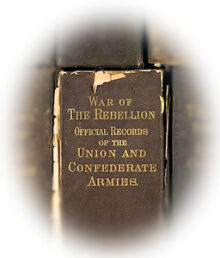WAR DEPARTMENT, January 29, 1861.
Lieut. ADAM J. SLEMMER,
First Regiment Artillery, U. S. Army, Commanding Fort Pickens :
SIR: The dispatch of which the inclosed is a copy was transmitted today, and the hope is indulged that it will be received before the arrival of the Brooklyn. Lieutenant Saunders goes as the bearer of this communication in order that the Department may be assured that the dispatch has reached you safely, and has suffered no alteration in its transmission, and also that his return may afford you an opportunity of reporting fully all that has occurred in connection with your command since the transfer of your forces to Fort Pickens. In the absence of any detailed information as to the circumstances under which this movement was made, I can only commend its patriotic purpose and express the gratification felt by the Department at its success.
You are instructed to act strictly on the defensive, and avoid as far as possible a collision with the hostile troops concentrated at Pensacola and in the adjacent forts. Should you, however, be attacked you will make the best defense of which your position and resources are capable. The naval forces of the United States now at Pensacola, or which may hereafter arrive there, it is expected will cordially co-operate with you. You will observe that it is expressly understood as the basis of instructions forwarded to you that the communication between yourself and others in command at Pensacola and the Government is to be kept open and unobstructed. You will avail yourself of this provision, and report by special messenger to the Department as events may justify or require it.
In your dispatches by Lieutenant Saunders you will make known the details of the transfer of your command, the forces which you now have available for active service, the strength of your position, the character of the preparations, if any, in progress which look to an assault upon the fort, and all other matters in any manner bearing upon your ultimate safety.
Respectfully, your obedient servant,
J. HOLT,
Secretary of War.
[Inclosure.]
WASHINGTON, January 29, 1861.
To JAMES GLYNN, commanding the Macedonian; Capt. W. S. WALKER, commanding the Brooklyn, and other naval officers in command; and Lieut. ADAM J. SLEMMER, First Regiment Artillery, U. S. Army, commanding Fort Pickens, Pensacola, Fla.:
In consequence of the assurances received from Mr. Mallory in a telegram of yesterday to Messrs. Slidell, Hunter, and Bigler, with a request it should be laid before the President, that Fort Pickens would not be assaulted, and an offer of such an assurance to the same effect from Colonel Chase, for the purpose of avoiding a hostile collision, upon receiving satisfactory assurances from Mr. Mallory and Colonel Chase that Fort Pickens will not be attacked, you are instructed not to land the company on board the Brooklyn unless said fort shall be attacked or preparations shall be made for its attack. The provisions necessary for the supply of the fort you will land. The Brooklyn and other vessels of war on the station will remain, and you will exercise the utmost vigilance and be prepared at a moment’s warning to land the company at Fort Pickens, and you and they will instantly repel an attack on the fort. The President yesterday sent a special message to Congress commending the Virginia resolutions of compromise. The commissioners of different States are to meet here on Monday, the 4th February, and it is important that during their session a collision of arms should be avoided, unless an attack should be made or there should be preparation for such an attack. In either event the Brooklyn and the other vessels will act promptly.
Your right, and that of the other officers in command at Pensacola, freely to communicate with the Government by special messenger, and its right in the same manner to communicate with yourself and them, will remain intact as the basis on which the present instruction is given.
J. HOLT,
Secretary of War.
ISAAC TOUCEY,
Secretary of the Navy.
